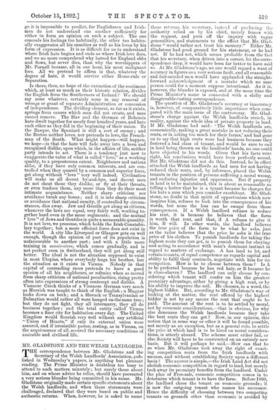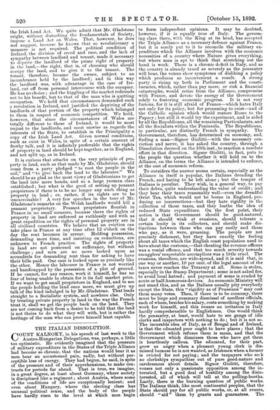MR. GLADSTONE AND THE WELSH LANDLORDS. T HE correspondence between Mr.
Gladstone and the Secretary of the Welsh Landlords' Association, pub- lished in Wednesday's papers, is anything but pleasant reading. The Prime Minister is doubtless too busy to attend to such matters minutely ; but surely those about him, and on whose advice he relies, should have prevented a very serious blunder being committed in his name. Mr. Gladstone originally made certain specific statements about the Welsh landlords, and when these statements were challenged, declared that they were based on public and authentic returns. When, however, he is asked to name these returns, his secretary, instead of producing the authority relied on by his chief, merely fences with the request, and puts off the inquiry with vague generalities, and statements to the effect that Mr. Glad- stone " would rather not trust his memory." Either Mr. Gladstone had good ground for his statement, or he had not. If he had not, which seems probable from the fact that his secretary, when driven into a corner, let the corre- spondence drop, it would have been far better to have said so. At Mr. Gladstone's age, no one would regard a want of accuracy in figures as a very serious fault, and all reasonable and fair-minded men would have applauded the straight- forward acknowledgment of a mistake which no sane person could for a moment suppose intentional. As it is, however, the blunder is exposed, and at the same time the Prime Minister's name is connected with a shifty and disagreeable-tasting correspondence.
The question of Mr. Gladstone's accuracy or inaccuracy is, however, of comparatively little importance when com- pared with the main issue of the controversy. Mr. Glad- stone's charge against the Welsh landlords struck, in reality, against the whole idea of private property in land. If Mr. Gladstone had said: The Welsh landlords are, economically, making a great mistake in not reducing their rents, or in asking too much for their farms,' and had gone on to say that high rents were bad business because they fostered a bad class of tenant, and would be sure to end in land being thrown on the landlords' hands, no one could have objected to his words. Given that his facts were right, his conclusions would have been perfectly sound. But Mr. Gladstone did not do this. Instead, he in effect attacked the Welsh landlords as bad men for not having- reduced their rents, and, by inference, placed the Welsh tenants in the position of persons suffering a moral wrong, and enduring injustice and oppression. But if property in land is to be maintained, this is about as reasonable as telling a hatter that he is a tyrant because he charges for his hats a sum which you consider exorbitant. Mr. Glad- stone, no doubt in that spirit of opportunism which now inspires him, refuses to look into the consequences of his words, but none the less can he escape from those consequences. If a Welsh landlord refuses to reduce his rent, it is because he believes that the farm is worth that rent, and that, if A refuses to give it him, B will. In other words, the landlord believes the true price of the farm to be what he asks, just as the tailor believes that the price he asks is the true price of his clothes. To punish landlords for taking the highest rents they can get, is to punish them for obeying and acting in accordance with man's dominant instinct in regard to matters of exchange. A has land to let, and certain tenants, of equal competence as regards capital and ability to fulfil their contracts, negotiate with him for its occupation. How is he to choose between them ? Is A to be preferred because he has red hair, or B because he is close-shaven ? The landlord can only choose by con- sidering which tenant will confer on him the greatest pecuniary advantage, either by giving a high rent, or by his ability to improve the soil. He chooses, in a word, the highest bidder. But, according to Mr. Gladstone's way of looking at the matter, the rent offered by the highest bidder is not by any means the rent that ought to be paid. The amount of the rent is to be settled by moral, not by economic considerations,—that is obvious, for why else denounce the Welsh landlords because they take the best rents they can get ? Now, in our opinion, this notion that in some way or other it will be found possible, not merely as an exception, but as a general rule, to settle the price at which land is to be hired on moral considera- tions, is utterly absurd. The scheme must either fail, or else Society will have to be constructed on an entirely new basis. But it will perhaps be said,—How can that be so when Mr. Gladstone took away the right of exact- ing competition rents from the Irish landlords with success, and without establishing Society upon a different basis ? The answer is simple,—the Irish Land Act did not abolish economic competition in regard to land, but merely took away its pecuniary benefits from the landlord. Under the plan of Free-sale, economic competition comes in to determine which tenant is to have the farm. Before 1880, the landlord chose the tenant on economic grounds ; it is now the outgoing tenant who names his successor. Hence the difficulty of choosing between two competing tenants on grounds other than economic is avoided by the Irish Land Act. We quite admit that Mr. Gladstone might, without disturbing the fundamentals of Society, impose a Land Act on Wales. That, however, he does not suggest, because he knows that so revolutionary a measure is not required. The political condition of Ireland, the division of creed and race, and the lack of sympathy between landlord and tenant, made it necessary to deprive the landlord of the prime right of property in the land,—the right, that is, of choosing who should occupy the land, and to give it to the tenant. The tenant, therefore, became the owner, subject to an incumbrance held by the landlord ; and in this way the landlord was, with advantage in the case of Ire- land, cut off from personal intercourse with the occupier. He has no choice ; and the higgling of the market redounds not to his benefit, but to that of the man who is quitting occupation. We hold that circumstances demanded such a revolution in Ireland, and justified the depriving of the landlords of that portion of the property which belonged to them in respect of economic competition. We hold, however, that since the circumstances of Wales are totally different to those of Ireland, it would be most unjust to the landlords, and most unwise as regards the interests of the State, to establish in the Principality a copy of the Irish Land Act. Given normal conditions, such as exist in Wales, in spite of a certain amount of frothy talk, and it is infinitely preferable that the rights of property in land should be kept together, as in England, and not split up, as in Ireland.
It is curious that attacks on the very principle of pro- perty in land, such as that made by Mr. Gladstone, should come from a party pledged " to root the people in the soil," and " to give back the land to the labourer." We should be as glad as the most viewy of Gladstonians to get the land into more hands, and so a large yeoman class established ; but what is the good of setting up peasant .proprietors if there is to be no longer any such thing as property in land ; or, rather, if its rights are to be unexercisable ? A very few speeches in the tone of Mr. Gladstone's remarks on the Welsh landlords would kill a peasant proprietary. Peasant proprietors flourish in France in no small measure, because there the rights of property in land are enforced as ruthlessly and with as great expedition as the rights of personal property are in all civilised countries. We believe that an eviction can take place in France at any time after 12 o'clock on the day the rent becomes in arrear. Holding possession, demanding more time, and insisting on reductions, are unknown to French practice. The rights of property in land are not possessed on sufferance, but without challenge ; and men are no more looked upon as scoundrels for demanding rent than for asking to have their bills paid. One case is looked upon as precisely like - the other. Hence the labourer in France is not worried and handicapped by the possession of a plot of ground. If he cannot, for any reason, work it himself, he has no fear of being unable to obtain for it its full market price. If we want to get small proprietors in England, and to see the people holding the land once more, we must give up talk of the kind indulged in by Mr. Gladstone. That leads straight to a Socialistic system, and nowhere else. Only by treating private property in land in the way the French treat it, shall we get the people back on the land. They are not coming back from a desire to be told that the land is not theirs to do what they will with, but is rather the heritage of the man who can prove himself least capable.



































 Previous page
Previous page